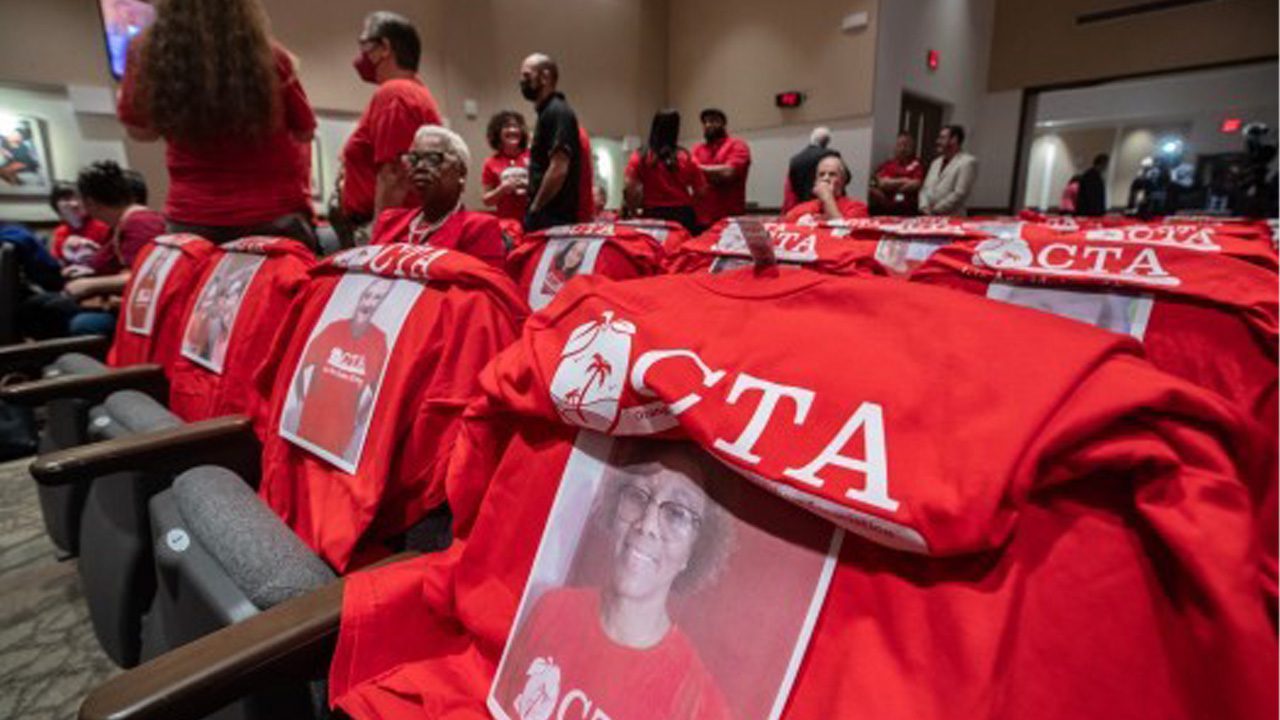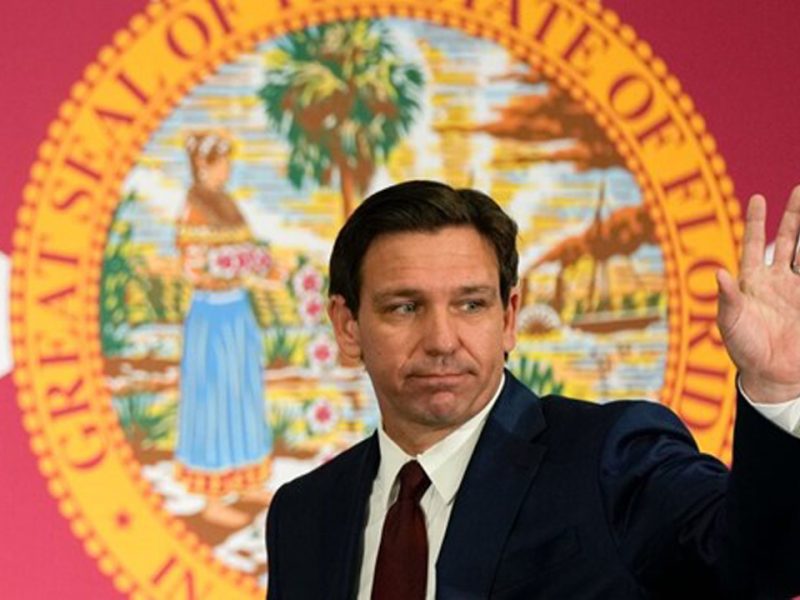OCPS, union reach deal on nearly 10% teacher raises, delays in full insurance hikes
Orlando Sentinel | By Leslie Postal | March 5, 2024
Orange County Public Schools and its teachers union reached an agreement Tuesday to provide “historic” raises of nearly 10% to most teachers and to hike their insurance premiums — but also to delay making employees pay the full cost of those insurance increases until the 2025-26 school year.
The last-minute agreement came as the Orange County School Board held a special impasse hearing to end the months-long labor dispute that centered on OCPS’ push to have employees pay more in premiums to help deal with “surging” health care costs.
The school board voted unanimously on the agreement almost nine hours after its meeting began.
In the morning, the board heard arguments from both district and union attorneys in a room with red union T-shirts — each emblazoned with a photograph of an OCPS teacher — draped over the back of empty chairs. The union displayed the T-shirts to represent teachers who could not attend the hearing in the middle of a work day.
After an extended afternoon break, the attorneys reached an agreement to delay the full insurance hikes, meaning the school board did not have to impose its own decision. The district will pay $4.4 million as a “premium discount” to help cover employee insurance costs next year as part of the deal.
If teachers ratify the agreement, they could get raises in April. The average annual raise would be $5,400, retroactive back to the first day of work for the current school year.
The union said it was happy with the district’s salary proposal but before the agreement had objected to the insurance increases because they would cost employees who need to cover spouses or children from $683 to $3,459 more a year, depending on which plan they select.
Board members said they were pleased with the 11th-hour agreement but also frustrated that district staff and the Orange County Classroom Teachers Association couldn’t reach an agreement until an impasse hearing was underway. Bargaining started months ago, and teachers have not seen raises as a result.
“I cannot believe it took you guys an hour in a room to figure this out,” said board member Melissa Byrd, noting many teachers were upset they did not get raises before the winter holidays. “I’m frustrated that we couldn’t have done this eight months ago.”
Board member Alicia Farrant, a mother of five, agreed, saying teachers deserve better than a “lengthy ridiculous process” that sometimes seemed like toddlers arguing.
Both board members and union leaders said they wanted a more collaborative approach for coming negotiations, which start this month.
Under the agreement, the insurance cost hikes will be about half the amount they will be in the following year, because of the $4.4 million the district agreed to provide.
About 90% of OCPS teachers would get raises of 9.7%. Raises that are a percentage, rather than a flat rate as they have been in recent years, are a “massive win for our teachers,” said Clinton McCracken, the union’s president.
The percentage raises will most benefit veteran teachers, who saw their wages stall when Gov. Ron DeSantis pushed to raise starting teacher pay and required most state money to go to that effort.
Most teachers will pay more in insurance premiums starting in September, when they get their first pay check of the 2024-25 school year. They will pay even more the following year when the full cost of premium increases are imposed.
OCPS and its teachers union have been at loggerheads for months not on teacher raises — there was agreement to provide the largest salary offer ever — but on whether they should be coupled with hikes in employee insurance premiums.
The district said its push to give raises of nearly 10% could be afforded only by requiring most employees to pay more in insurance premiums. But administrators argued the big raises would offset the higher insurance prices.
The district, which is self-insured, needed to hike employee insurance premiums because its insurance fund has been running a deficit since 2019. Federal COVID-19 relief money helped shore it up, but that money will soon run out.
The fund’s deficit is projected to be $42 million for the current school year and $61 million for next year, said Jeffrey Mandel, attorney for the district.
“Every dollar we spend on health insurance is a dollar that we could not spend on teacher pay increases,” he said.
The district will still pick up the “lion’s share” of employee health-care costs, he added, but it needs employees to chip in more, too.
The union also worried that newly hired teachers would pay even more for health insurance, creating a two-tier system based on date of hire “at a time when we’re trying to recruit new teachers for the many teacher vacancies we have across the district this year,” McCracken said.
“We urge you to please reject these increases. They are simply not affordable for teachers and their families,” McCracken said before the agreement was reached, adding that the proposed salary increases are necessary just to keep “teachers afloat.”
The district and the union, at impasse since August, pleaded their cases to the special magistrate in November. Magistrate Barry Goldman issued his recommendations earlier this month, agreeing with the union that health insurance costs should not be a part of the pending contract.
Goldman wrote that he did not consider the district’s health insurance hike “astronomical,” as the union contended, and noted the impact “fairly disappears” when coupled with the proposed salary increases.
But Goldman wasn’t convinced the insurance issue was rightly before him since the cost of the increases would not go into effect until next school year, so he recommended it not be adopted.
The union initially wanted the board to agree with Goldman’s view, while the district argued the magistrate’s recommendation on health insurance should be rejected because it could not afford the raises without reining in insurance costs.
OCPS has not raised insurance rates for four years and, in that time, has contributed more than $100 million to cover shortfalls in its insurance fund, officials said.






